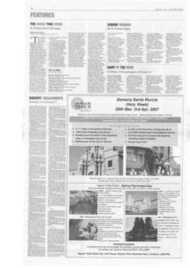Page 4, 2nd February 2007
Page 4

Report an error
Noticed an error on this page?If you've noticed an error in this article please click here to report it.
Tags
Share
Related articles
An Unprecedented Defence Of Pius Xii
Vatican Plans To Open Secret War Archives
Pope Benedict Defends Role Of Wartime Pontiff
By Fr Tim Finigan
Pius Was On The Right Side Of History, Says Lord Black
How the Kremlin smeared Pius XII
sk most people whether Pope Pius XII was guilty of selling out the Jews in the Second World War and invariably they'll say yes. So effective has this smear campaign been against the former Pontiff who is now close to being declared Venerable by the Church that it's been a stumbling block in Jewish-Catholic relations for years.
But if, as many Church and even some Jewish historians now affirm, the allegations are false, how and why did this campaign start? The blame, according to retired KGB general Ion Mihai Pacepa, can be put squarely at the foot of the Kremlin. Writing in the American journal National Review Online, Pacepa claims that Soviet agents set out to deliberately portray Eugenio Pacelli "as a coldhearted Nazi sympathizer" as part of a "super-secret plan for destroying the Vatican's moral authority".
The former senior KGB operative in Romania reveals how the Kremlin ordered him to obtain access to the Vatican secret archives so the KGB could "slightly modify" them. He says that between 1960 and 1962 he sent hundreds of archival documents connected in any way with Pius XII, none of which, however, were incriminating.
Soon after, in 1963,a powerful play called The Deputy was performed which attacked Pius XII the first recorded incident in which the former Pontiff's reputation was publicly called into question. Pacepa, the highest-ranking agent ever to defect from the Soviet Bloc, claims the original playwright, Erwin Piscator, a fervent Communist with close links to Moscow, based the play on the (doctored) documents that Pacepa had retrieved from the Vatican archives.
Speaking to The Catholic Herald, Fr Peter Gumpel, postulator of Pius XLI's cause, described the disclosure as "very interesting", but added that it needs to be "treated with a little caution".
Much of what Pacepa says about the play is accurate, he said, adding that the Communist link to the smear campaign is not new.
Fr Gumpel. however, has some doubts. Above all, he is sceptical that Agostino Casaroli (later Vatican Secretary of State) would have given Pacepa access to the archives, as the former agent asserts.
According to Pacepa, the KGB working through himself and the Romanian government asked the Vatican for access to the archives ostensibly to see if there were historical roots that would justify restoring relations between Romania and the Holy See. He also claims the Vatican was offered a one-billion dollar interest free loan for 25 years in return for access to the files. Fr Gumpel is waiting to hear back from the prefect of the Vatican archives to see if Pacepa's claims can be verified.
Pius XThs cause, meanwhile, is progressing well, according to Fr Gumpel. After passing the scrutiny of historians and theologians, 3,500 pages of documentation are now being examined by a panel of cardinals and bishops. He predicts that in four to five months time the panel will agree to pass it on to the Pope who is then free to issue a decree testifying to evidence of heroic virtue. Pius XII would then be declared "'Venerable". Beatification, which will depend on the authenticity of reported miracles, is a longer process, but Fr Gumpel said he hoped "it will happen soon".
Reports over the weekend that the Pope's Latinist, Fr Reginald Foster, believes Latin is dying were somewhat exaggerated. The colourful Discalced Carmelite from Milwaukee actually believes interest in Latin is strong. Classes at his academy near the Pantheon are usually oversubscribed, often with non-Catholic professionals. Some of his students bring whole families along to class, and even the Italian police have been knocking on his door recently, asking if he would decipher a message written in Latin by a mafia boss on the run (the message turned out to be nonsense, though the Latin was well constructed). Latin's appeal, he argues, is that it is actually a forward-looking language that broadens the mind. But he's pessimistic about the survival of the language in the Church which, after the Second Vatican Council, "threw the baby out with the bathwater". Church officials are "living in another world", he says. "If they come down to my classrooms, I'll show them." You can enrol in Fr Foster's classes, including his eight-week summer school, by faxing +39 0658540300.
blog comments powered by Disqus

















